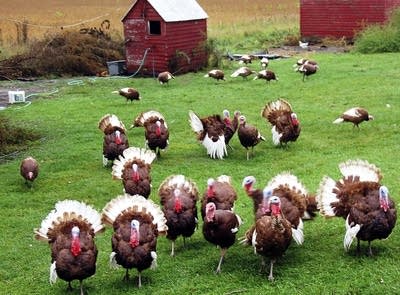Minnesota couple nurtures endangered farm animals
Go Deeper.
Create an account or log in to save stories.
Like this?
Thanks for liking this story! We have added it to a list of your favorite stories.

Our quest to protect endangered animals can take us to some very wild places. In this case it leads to a place very tame: A small farm in Lac qui Parle County.
Humble Roots Heritage Farm is home to a happy mix of domesticated farm animals that are rapidly disappearing from the world.
Purebred Mulefoot pigs, curious and friendly as farm yard dogs, muck around in the mud and forage in the grove unaware that at last count, there were only 200 of them documented elsewhere in the world.
A flock of Bourbon Red turkeys, show-offs every one of them, strut around the yard as if it were still the 1930s and 1940s when they were as common on American farms as barn cats.
Turn Up Your Support
MPR News helps you turn down the noise and build shared understanding. Turn up your support for this public resource and keep trusted journalism accessible to all.
Today, the American Livestock Breeds Conservancy based in North Carolina lists the turkeys on its "watch" list of domesticated fowl in decline.
The organization raises a similar red flag about the status of the Swedish and Indian Runner ducks, two small flocks of which join the menagerie of animals that lay claim to this six-acre Noah's Ark on the prairie.

"I'm always looking for something I like to look at," said Jessi Wood, the farmer responsible for the colorful animals.
Yet make no mistake: This is all about farming.
It will not be long before the majestic-looking and tasty turkeys become the center of attention on Thanksgiving tables. Mulefoot pigs make fabulous hams; the Swedish ducks are as flavorful a waterfowl as was ever enjoyed; and Indian Runner ducks are prized - and fed - for the eggs they lay.
And while they grow to market size, these animals are just a hoot to have around, according to Wood. "They're fun, they really are," she said.
Wood and her husband, Joey Stout, began raising the heritage breed animals both as a venture into sustainable agriculture and a desire to protect them and the genetic traits they represent.
Wood makes no apologies for the fact that many of these animals are destined for local dinner tables. She is convinced that their survival as unique breeds depends on developing profitable markets so that others will raise them as well.
She said it's very unlikely that we will start building zoos to hold the 150 breeds of livestock and poultry currently listed by the American Livestock Breeds Conservancy to be at risk of becoming extinct.
The decline of these breeds has much to do with the twin driving forces of economic efficiency and standardization in agriculture today. Wood said the Mulefoot pigs are believed to have come to the Americas in the 1500s with the Spanish. In more recent times, farmers along the Mississippi River would let them forage on islands and harvest them to make hams and lard, she said.
But these pigs take a full year to reach a market weight of 230 pounds, compared to the 280 pounds that large white pigs so prevalent today can reach in only six months, said Wood.
The stunning colors and flavorful meat of the Bourbon Red or Rouge turkeys have been displaced on American farms by bland, vanilla-colored turkeys that grow twice as fast and twice as big. The carcass weight of the best Bourbon Red turkeys tops out at around 12 pounds. Compare that to the 30-pound behemoths that farmers can produce from today's standardized, white turkeys.
The bottom line is that Wood and others raising these heritage breeds need to receive better-than-supermarket prices for their meat. Wood is finding that market, thanks both to a growing local foods network and her own ties to the local and natural foods network in the Twin Cities.
She said her customers appreciate the flavorful meats, but that's not all. She said it is equally important to her customers to know that the animals have been raised free-range, and not fed antibiotics or chemical additives.
Her animals have free rein over the farm, although an electric fence keeps the nosey pigs from wandering into the yard and tugging on the pant legs of unsuspecting visitors.
It isn't just the animals who thrive in this sort of environment. Wood said she and her husband moved from the Twin Cities to the rural landscape because that's where they wanted to raise their children.
---
Information from: West Central Tribune
(Copyright 2009 by The Associated Press. All Rights Reserved.)
Dear reader,
Political debates with family or friends can get heated. But what if there was a way to handle them better?
You can learn how to have civil political conversations with our new e-book!
Download our free e-book, Talking Sense: Have Hard Political Conversations, Better, and learn how to talk without the tension.





